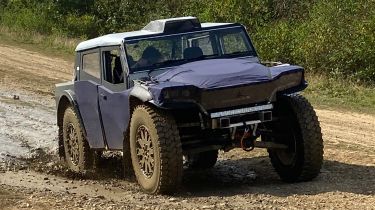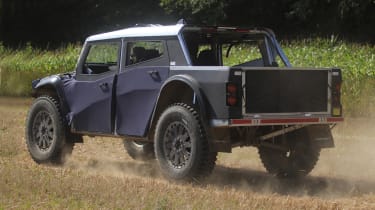New Fering Pioneer 4x4 launched by eco-conscious British brand
The Fering Pioneer's range extender powertrain has a maximum range of more than 4,000 miles
This is a new low-emission off-roader called the Fering Pioneer. Its creators say that it’s capable of tackling the world’s toughest terrain and, unlike traditional 4x4s, it won’t damage the planet too much on its way.
The Pioneer is the brainchild of ex-Ferrari and McLaren engineer Ben Scott-Geddes, and it uses plenty of supercar-derived weight-saving tactics in its construction. Here though, they’re used to improve its efficiency.
The chassis is an aluminium and composite spaceframe, and those strange fabric body panels are made from the same sort of canvas found on high-end hiking boots. Fering says the Pioneer’s fabric body has better insulating properties than metal bodywork and is better at shrugging off the kind of damage sustained on off-road trails.
This combination makes for a very light car. Even though it’s the same size as a delivery van and capable of carrying a similar payload to a heavy-duty pick-up truck, the Pioneer only weighs around 1,500kg – or the same as a family hatchback.
Its powertrain comprises a pair of electric motors (one for each axle) and a lithium titanate oxide battery, which Fering says has been designed to withstand the sort of extreme weather conditions that would damage a conventional lithium-ion battery.
The system puts out 600Nm of torque and has a maximum electric range of just 50 miles, which doesn’t sound like a lot. However, the Pioneer’s battery pack is supported by an 800cc three-cylinder diesel-powered range-extender engine, which sips fuel from two enormous drums to provide a maximum range of 7,000km (around 4,300 miles).
The generator returns around 50mpg, and Fering says the massive range offered by the system makes the Pioneer ideally suited to long-distance expeditions or rescue missions. And, for shorter journeys, the massive fuel tanks can be swapped for smaller ones, leaving enough room for water tanks to sustain the occupants.
The Pioneer has been designed to be simple and easy to work on, meaning it can be upgraded easily, once better technology becomes available.
Fering says it can also adapt the powertrain to suit the most popular fuel in whatever region the vehicle is operated in. There are plans for an ethanol-powered engine for Brazil, for example, and a hydrogen fuel cell version for Asia.
The wheels measure 22.5 inches in diameter and accept a standard size truck tyre, which Fering says should be readily available in even the most remote locations.
Fering has already built its first Pioneer prototype, and is currently pushing it through a demanding development programme. Series production is scheduled to start in the UK during the first half of 2022.
Now click here to read all the latest news on the similarly rugged Bollinger B1 and B2 electric off-roaders…
Find a car with the experts






